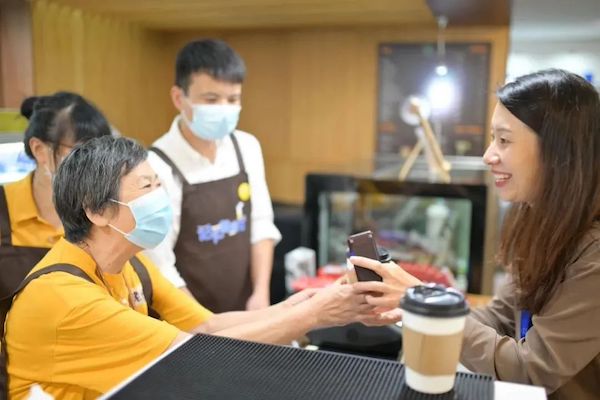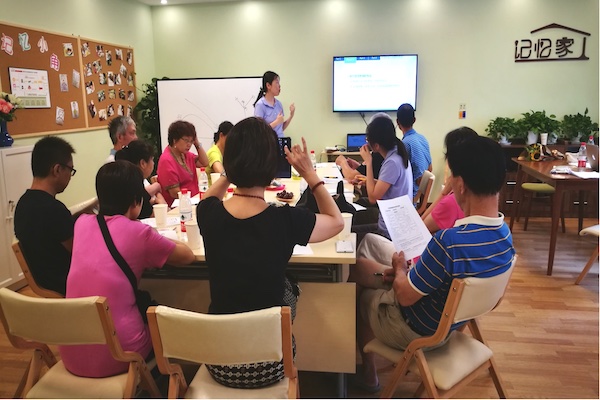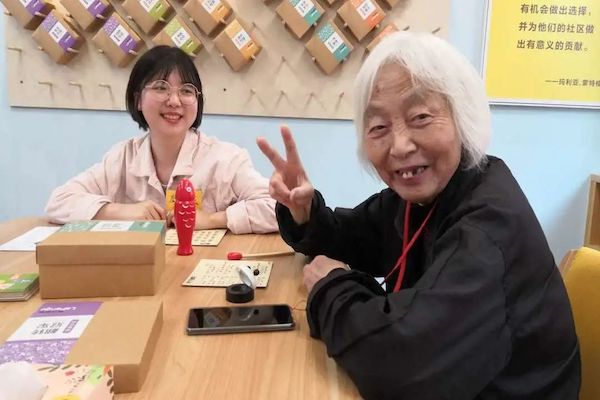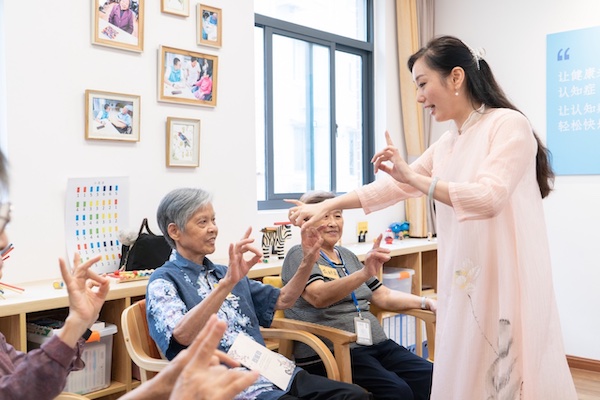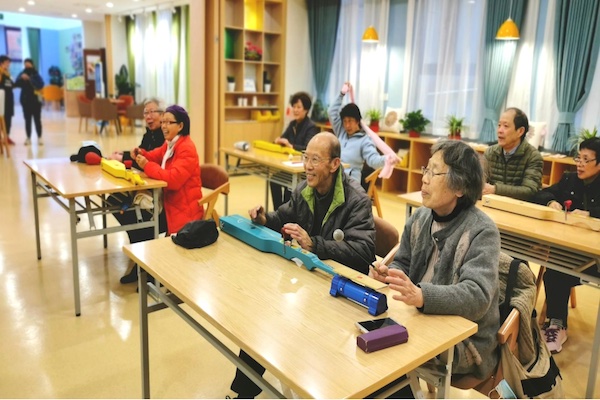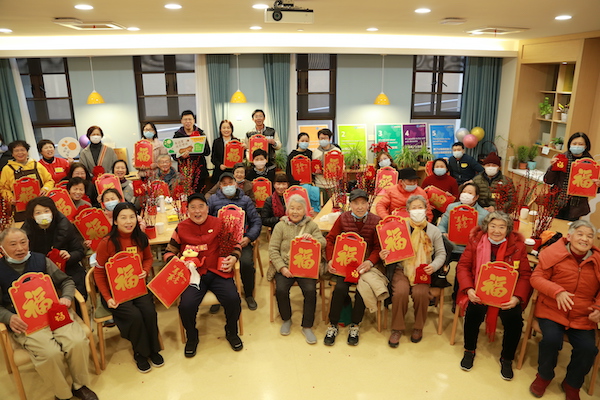2022 HAPI Grand Prize Winner
China will soon be considered an aged society, and cities like Shanghai are on the leading edge of that curve. In fact, 16.3 percent of Shanghai’s population in 2020 was 65 years or older, and well over 30 percent are 60 years or older. As a result, the number of people living with dementia is also high. Shanghai now has an estimated 300,000 residents living with dementia. But despite the growing number of cases, there is still little public understanding of the disease, and the stigma and discrimination surrounding it has led to low rates of both assessment and diagnosis of dementia and placed tremendous pressure on the families of those with dementia.
To address these concerns, the nonprofit Shanghai Jinmei Care for the Elderly created Memory Home, an innovative model for community-based physical spaces where social workers provide those with dementia and their families with professional support and diverse programs, covering almost all aspects related to dementia, from pre-diagnosis advocacy and education to post-diagnosis support and intervention.
Jinmei Care began its work a decade ago, setting up a small mutual-help caregiver group and organizing educational and preventive activities for the elderly in the community. Working with partners from Beijing, they introduced and launched an international Dementia-Friends campaign in Shanghai in 2016 and opened their first Memory Home in the Tangqiao community in 2017.
In Memory Homes, Jinmei Care’s social workers, assisted by volunteer “Dementia Friends,” focus on six primary areas: (1) educational programs; (2) preventive, risk-reduction activities that help the elderly remain socially active and develop a healthy lifestyle; (3) cognitive function assessments and cooperation with hospitals to ensure high-risk older persons get diagnosed; (4) non-medical interventions (e.g., music, dancing, art, etc.) to slow the decline of cognitive function and help regain self-confidence; (5) support for caregivers (e.g., one-on-one consulting with a case manager, family-care courses, wellbeing activities, mutual-help groups, etc.); and (6) interactive, intergenerational programs that promote Dementia-Friends and Dementia-Friendly Organizations to build social awareness and eliminate discrimination.
These services have a tremendous impact on people’s lives. One couple, Mr. and Mrs. Z, had lost hope after the husband was diagnosed with moderate-severe dementia. Their daughter found information online about a Memory Home, which happened to be located near their residence. Jinmei Care’s social worker did a detailed analysis of the family’s needs and came up with a tailor-made intervention and support plan, offering suggestions to address both physical and mental health needs for both the patient and caregiver. By attending courses and lectures, reading educational materials, talking to senior caregivers, and seeing the social worker’s demonstration of interacting with her husband, Mrs. Z gradually changed her understanding of dementia, adjusted her mindset and expectations, and was able to relieve much of her anxiety. Meanwhile, Mr. Z’s situation improved as he regularly attended non-medical intervention activities.
Based on the real needs of families with dementia, Jinmei Care builds up a two-way referral/green channel between the hospital and the Memory Home and invites doctors to the Memory Home for regular consultations, which significantly increase the diagnosis rate after assessment. By bringing the medical resources of the hospital back into the community, it creates a mutual reinforcement between medical and non-medical treatments and home care.
The flagship Memory Home was set up in 2021 in the Yangjin community along with a Daycare Center for Dementia and a Memory Café. This was a new attempt to merge non-medical intervention and caregiver support with community interaction and sustainable fund-raising. The Memory Café was inspired by the practices of other countries like Japan. In the café, older persons with mild cognitive impairment or mild dementia symptoms can receive special cognitive function training through the process of making coffee, counting money, and interacting with guests. This special staff gain self-confidence and a sense of belonging by providing a service for others. Caregivers are treated as VIPs at the café, while the general public are given an opportunity to learn about dementia and to become a Dementia-Friend simply by buying a cup of coffee as a donation and giving the older server a smile, even though they may get a latte instead of the Americano they ordered. All the income is used to fund the operations of the Memory Home.
As of 2022, Jinmei Care had established 21 Memory Homes throughout Shanghai. More than 100,000 older people have taken part in educational and preventative activities, and more than 80,000 have received a cognitive function assessment. Moreover, they have been able to have 60 percent of those assessed as being at high risk go on to visit the hospital for further diagnosis and medical treatment, which is a relatively high ratio. They have more than 650 caregivers in an online mutual help group—which has been particularly important during the pandemic—and more than 2,000 families have received consultations or support services.
They have also developed a network of around 10,000 Dementia-Friends and 200 Dementia-Friendly Organizations. Dementia-Friends workshops and events have encouraged individuals and groups to help spread accurate information to eliminate discrimination, utilizing skills and creativity to help Memory Home’s work. For example, students from Yew Chung International School established their own Dementia-Friends association. Members designed an interesting cartoon app to share dementia-friendly ideas and organized various creative activities for the elderly in Memory Homes.
They are also having an impact at the policy level. Starting in 2019, the local government launched the Shanghai Dementia-Friendly Community Construction (DFCC) Project, and Jinmei Care has been working with them to develop courses and toolkits to enable more organizations to take on the DFCC Project. The city’s goal is to have all 216 communities in Shanghai be DFCs by 2025.
The Memory Home activities and services are provided at no cost to older persons and their families. The program is funded through the local government’s DFCC project, social foundations, and donations from companies and individuals (including the Memory Café proceeds).
KEYS TO SUCCESS
- Comprehensive approach that addresses needs of those with dementia, their caregivers, and the community, and creates a bridge between medical, non-medical, and home care.
- Adaptation of international examples to the Chinese social context and situation, taking into consideration the unique operational mechanisms of the local community.
- Focus on the families and the community to gain a deeper understanding of where the needs and sticking points are and help identify effective solutions.
- Strong commitment to being a community leader by integrating existing resources, collaborating with industry partners, and coordinating different forces to work and contribute together.
- Dementia-Friends and Dementia-Friendly Organization activities, as well as social advocacy via social media, that promote greater understanding of dementia, decrease the stigma, and also raise support for the work of Memory Homes.
- Close collaboration with the local government on promoting the implementation of the corresponding policy and project, which enhances the organization’s credibility, ensures project sustainability, and makes social change happen more efficiently.
Related Resources


